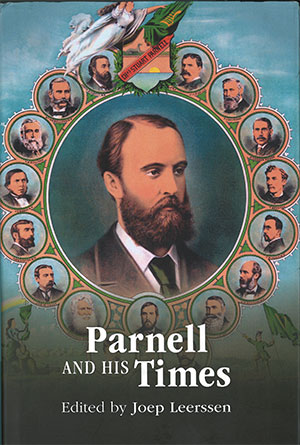Parnell and his times
Published in Book Reviews, Book Reviews, Issue 5 (September/October 2021), Reviews, Volume 29 JOEP LEERSSEN (ed.)
JOEP LEERSSEN (ed.)
Cambridge University Press
£30
ISBN 9781108861786
Reviewed by Margaret O’Callaghan
Margaret O’Callaghan is a historian and political analyst at Queen’s University, Belfast.
This is a collection of essays written by some of the distinguished scholars who have held the annual Parnell Fellowship at Magdalene College, Cambridge, over the past decades. It is dedicated to Eamon Duffy, historian of the English Reformation, Fellow of Magdalene, and key figure in the beginning and continuation of the Parnell fellowship.
Most readers opening this book would find it confusing. The editor states in a short acknowledgements section that at a gathering of some of the Fellows in 2017, ‘when the centennial commemorations of the Revolutionary Decade 1913–22 were unrolling’, they decided to reassess ‘the many different aspects of Ireland’s transition … into the twentieth century’ under ‘the looming presence (and absence) of Parnell’. Later, on page 17, at the end of the introduction, the editor suggests that there may have been an intention to place the revolution in a wider temporal frame going back to the 1880s, which is a brilliant idea. It is not clear whether the texts published here were the Parnell lectures as given or whether they are later adaptations to this commemorative or wider-framing rubric.
One’s initial reaction is that ‘the boys are back in town’. The list of contributors constitutes a veritable Who’s Who of Irish historians, particularly male Irish historians, although some Irish women historians have (surely) given these lectures and are not included in this volume. Since no list of Parnell Fellows or their essay titles or the years in which they were given is provided, it is hard to be sure. The historians are Oliver MacDonagh, Paul Bew, Roy Foster, Raymond Gillespie, David Fitzpatrick, Nicholas Canny and Thomas Bartlett. Leerssen himself, Frank McGuinness, Dennis Donoghue, Declan Kiberd and Terence Brown are all primarily literary/historical scholars, as are all five of the women contributors—Angela Burke, Edna Longley, Helen Vendler, Claire Connolly and Clair Wills.
Parnell walks in two of Paul Bew’s evocations—as a young man singing along with bronzed young soldiers from the American Civil War, roaring out Michael Scanlon’s song ‘Out and make way for the bold Fenian men’ in his mother’s drawing room; in another, some months before his death, Parnell bidding his friend to sing Tom Moore’s ‘The meeting of the waters’ at the spot evoked at Avondale while picnicking with old friends over hard-boiled eggs, salt and sherry, on which hangs a tale.
We know that the Parnell Fellowship at Magdalene College was a key political site throughout the late 1980s and beyond. Battles fought in the Irish embassy in London about the teaching of Irish history in England shaped what happened in Cambridge and Oxford. This collection needs some clear historical information on their background—what the Parnell Fellowship was and is, when it started, the years in which these lectures were given, if these are the lectures as given, and the criteria for selecting who gives them.
Are the lectures supposed to address key debates on the Parnellite period, or are these a selection of essays chosen because of the decade of centenaries to reflect on the transition outlined by the editor? For Bew a key debate is about Parnell’s position on the land question. Was Parnell really a conservative with the interests of the landlord class central to his strategy, while simultaneously entangled in dangerous Fenian ties? The answer is probably not clear and would require engaging in greater detail to explore fully, which would be interesting. For Roy Foster the central question is to focus on and tease out the ramifications of the frequently quoted and debate-shaping lines of William Butler Yeats: ‘The modern literature of Ireland, and indeed all that stir of thought which prepared for the Anglo-Irish War, began when Parnell fell from power in 1891’.
In looking at that transition from Land War to revolution under the shade of Parnell there is a failure in the collection to deal with substantive issues of ideology or high politics, political interests and political party cultures. What happened to the rhetoric of the Land League? Did having an intelligence-gathering armed constabulary affect political culture? How do the literary high politics of the Revival relate to the arguments about democracy, nationality and rights? What happened to the political rhetorical idiom of the post-Pigott Parnellite press? Did the Ladies’ Land League get it all wrong? What about the Irish Loyal and Patriotic Union? Or the Irish Landowners’ Convention? What were the English political parties up to? Was Parnellism and Crime as important as I have suggested in my own published work? Was the Parnellite project already closed by the Tory refusal to treat with Home Rule—well before the divorce case? There are endless questions on the 1880s and ’90s.
The political literary essays are fascinating, particularly Edna Longley’s compelling and convincing exploration of the Yeats/Joyce relationship and McGuinness’s almost shocking reading of Joyce’s ‘A Painful Case’ through the palimpsest of Parnell’s adultery. Nevertheless, in terms of actually discussing the Parnellite period as opposed to the Parnell myth and legacy, the collection disappoints. Denis Donoghue, who has sadly died since publication, writes surprisingly and revealingly. Tom Bartlett’s essay on F.X. Martin and 1916 is superb, as is Leerssen’s on anthologies. You will read uniformly important and interesting work on modern Ireland by very clever people here. One of the greatest, Oliver MacDonagh, has been dead for many years. The publication acknowledges and mourns the death of David Fitzpatrick.
















